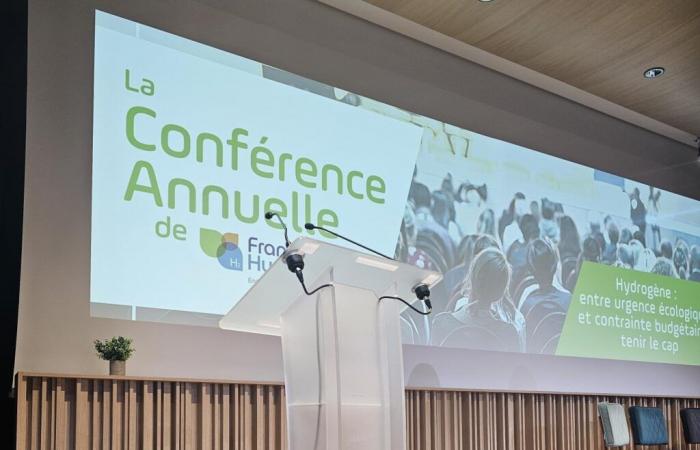France Hydrogène was hopeful that the long-awaited revision of the national strategy would be published before the end of the year, and – why not – that it could even be announced on the day of its annual conference. The program even announced the names (subject to reservation) of Olga Givernet, Minister Delegate for Energy, and Marc Ferracci, Minister Delegate for Industry. But the censorship of the Barnier government on December 4 called everything into question. France Hydrogène generally agrees with the orientations of the document in preparation, even if the wish is to have more ambition in the hydrogen transport infrastructure and support for mobility. The association also wants the State to release funds for the winners of the 3rd and 4th waves of the IPCEI, including Lhyfe, Airbus, Michelin, and Gen-Hy. This delay causes pressure on companies’ cash flow.
Jobs and wealth
In this difficult context, the association nevertheless wanted to be positive. And she wanted to show that the sector is not supported at a loss, quite the contrary. According to a study carried out by BDO, it already generated 16,400 jobs (including 6,300 direct) in 2023. And this figure will increase to 66,600 in 2035. “Employment will be distributed across all regions, even if some will weigh more than “others,” indicated Philippe Boucly. In terms of turnover, we note that the sector was already generating a turnover of 2.4 billion euros in 2023 (including 700 million in production, 200 million in storage and transport and the rest in uses), with an added value of one billion at the level of GDP. The amount expected in 2035 is 32 billion. And it is mobility (in general, therefore road, air, rail and maritime) which will weigh the most, representing 54% of the value. On the other hand, in terms of hydrogen production, it is the industry and the manufacture of synthetic fuels which will represent 70% of the volumes. Furthermore, the sector can contribute up to 7% to the reindustrialization effort. And it could also reduce the trade balance deficit in goods by 8%, which is not negligible. For the President of France Hydrogène, the State benefits if it invests in hydrogen. For 9 billion invested, the return is estimated at 36 billion (taxes, social security contributions) by 2030. That is, 4 times the investment. But this is due to a certain number of conditions which are explained in the study. Which is based on an in-depth analysis of the economic activity of more than 120 projects, 200 companies and 340 establishments.
The key figures for 2024
Among the key figures, we can cite the 24 active factories (electrolyzers, fuel cells, tanks, vehicles, stations). There are also 58 hydrogen buses in circulation (700 in intention to order), 7 household waste bins (150 in intention to order), 1,000 taxis (5% of the fleet in Ile-de-France, with an addition of 500 vehicles thanks to Toyota during the Paris Olympics). There is also a reduction of €4.70 per kilo. This is what the revision of the TIRUERT* could bring if it were applied. A boost that would be welcome for road mobility. Regarding key events, the President of France Hydrogène recalled the inaugurations of the HdF and Mcphy giga factories, the opening of the Dijon station, the increase in the taxi fleet during the Olympics, the commissioning of the Villabé station south of Paris at Hyliko, the christening of the Alba training ship in Corsica and finally the inauguration on the Seine of the Sogestran barge (see the highlight).
*incentive tax relating to the use of renewable energy in transport
Hydrogen mobility: Atawey calls not to lose confidence
Hyvia’s name was mentioned several times during this annual conference. And the difficulties encountered by the Renault and Plug joint venture underline the need – more than ever – to support hydrogen mobility. This theme was addressed by Jean-Michel Amaré, CEO of Atawey. He indicated that a mobility plan would be presented “very soon” by France Hydrogène. Which plan provides for 260 stations and 70,000 vehicles in circulation by 2030 and a desirable investment of 100 million per year to “prime the pump”. “Manufacturers tell us that they need support for the first 10 to 20,000 vehicles, before they can achieve parity with the price of battery electric,” Mr. Boucly then added. For the President of France Hydrogène, a support mechanism is also needed for the establishment of stations planned under the AFIR. “We cannot ask hydrogen to do in 4 years what electric could do in almost 20 years,” insisted Jean-Michel Amaré. And he took the opportunity to call for an end to the controversies, against a backdrop of “beliefs” and “H2 bashing”. A speech shared by the Rhône deputy Jean-Luc Fugit (also President of the High Energy Council) who believes that “we must place science above beliefs”. For him, there is “a complementarity between energies” and “it is better to add up the solutions to get away from fossil fuels”. “Let’s not lose confidence,” insisted the CEO of Atawey. And to continue; “We are lucky in France to have research centers which have given birth to technologies and leading players”. He then predicted that, in the absence of support for mobility players, including SMEs and SMIs, “we will give way to Asian and American players who will have critical mass”.
Lagging behind other European countries
MP Jean-Luc Fugit expressed his regret for the delay in publishing the revision of the national hydrogen strategy. However, he wanted to be optimistic by revealing that the resigning Minister of Industry, Marc Ferracci, had asked to meet him to discuss several subjects including that of hydrogen. “We are falling behind our neighbors,” believes Philippe Boucly. “The State must initiate the planned measures: the mechanism to support the production of hydrogen by electrolysis, develop uses by supporting the start of road mobility, get involved at the European level for the rapid development of pilot markets, create the conditions for a competitive and secure supply of hydrogen: electricity at an affordable price and plan the export sector. During round tables, the expectations of manufacturers were discussed by Vincent Charlet from La Fabrique de l’industrie and Guirec Dufour from Qair France. It was also a question of sovereignty (technological, technological and industrial) of Europe with a panel bringing together Valérie Bouillon-Delporte (Executive Director of the Clean Hydrogen Partnership); Pascal Canfin (MEP); Grégoire Chauvière Le Drian (leader of the EIB in France); or Frédéric Petit (MP, coordinator of the “Energy Sovereignty” working group of the Franco-German Parliamentary Assembly). Mr. Canfin announced that Germany would perhaps soften its position on nuclear power, a point which could benefit France.
Philippe Boucly reappointed President and new governance
During its General Assembly, which followed the annual conference, the association adopted new governance. It reflects the diversity and richness of the players (more than 450 members) in the sector.
To stay the course, Philippe Boucly was re-elected President of France Hydrogène. “I am approaching this new mandate with renewed confidence from the members of the Council, and surrounded by governance representative of all the stakeholders gathered within the association,” he comments. And to continue: “The arrival of new administrators enriches our vision and our collective expertise, essential to face the pressing challenges of the energy transition and the uncertain context in which France is today immersed.”
No Co-President for this year 2025, as Valérie Bouillon-Delporte was appointed Executive Director of the Clean Hydrogen Partnership a few months ago. On the other hand, we can note that the First Vice-President is Jean-Michel Amaré, the CEO of Atawey. A player very involved in the mobility plan which will soon be presented. Among the new features, we can cite the arrival of Christelle Rouillé, from Hynamics, to the Board of Directors within the “Large Groups” Industrial College, as well as within the office. We must also mention Laurent Favreau, President of SYDEV, the Departmental Energy and Equipment Union of Vendée, which includes the “Public and parapublic organizations, Associations” College; or that of Eric Campos, Director of Social Engagement at Crédit Agricole, who joins the “Transversal Services” College
The France Hydrogène Office is established as follows:
President : Philippe Boucly
1st Vice-President: Jean-Michel Amare
Secretary General: Cécilia Fouvry-Renzi, Air Liquide
Treasurer : Bertrand Chauvet, Seiya Consulting
Members of the Bureau: Christelle Rouille, Hynamics; Sylvie Denoble-Mayer, Engie; Laurent Antoni, CEA; Yves Faurisson, Michelin; Catherine Azzopardi, HRS.






